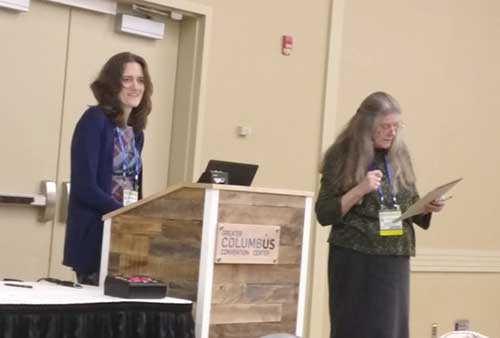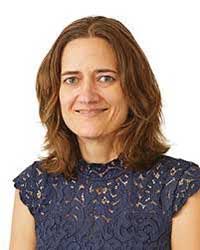Involving Physicists in Human Rights
At the APS April meeting in Columbus, Ohio, the Andrei Sakharov Prize was awarded to two individuals who embody the values of the man after whom the prize is named. Ravi Kuchimanchi used his physics knowledge to help those in need with the Association for India’s Development (AID). Narges Mohammadi sacrificed her scientific career and liberty speaking up for the rights of others in Iran. In addition to recognizing scientists who uphold human rights with the Sakharov prize, the APS has a standing committee to monitor human rights concerns for scientists throughout the world, the Committee on International Freedom of Scientists (CIFS). The Sakharov Prize session was sponsored jointly by the Forums on International Physics (FIP) and Early Career Scientists (FECS). I spoke about current human rights cases and presented physicists a way to involve themselves in these concerns.
There are many ways you can become involved in human rights activities. The first thing is to stay informed. There are a few organizations dedicated to helping academics from all fields, such as Scholars at Risk, and several that focus on scientists, such as APS-CIFS, the AAAS Science & Human Rights Coalition, and End National Security Scapegoating. They are all good sources of information, in addition to your favorite daily news source. If interested in a more in-depth discussion about the intersection between science and world affairs attend a Pugwash Conference.
You can educate others about human rights activities. This can be as simple as discussing these issues with colleagues or friends. If you are involved in teaching, incorporate these issues into your classes. This can be accomplished in multiple ways. Teach science through the lens of human rights by taking human rights problems that are of concern to your students and teaching them ways in which science can help to solve those problems. When discussing Albert Einstein in Introductory Physics, mention his Nobel Prize, but also his views on peace, nuclear disarmament, and civil rights. Einstein was not only a world-renowned physicist but a great defender of human rights. Students will begin to see scientists in multiple societal roles and, one hopes, themselves as well. If you are ambitious, develop a course around these issues. I teach “Navigating Global Nuclear Issues,” which looks at the development of nuclear weapons and the impact they have had on the countries and people of the world. Tap into university resources and invite a science ethics seminar speaker or add a peace and human rights seminar to your physics REU program.
Finally, take action. CIFS need your help. Report any human rights violations, in any part of the world, via email on our website. In addition, CIFS relies on a network of discrete contacts to gather and verify information. Please consider signing up for our network of scientists noting any physics specialty or foreign language proficiency. Even more specialized is the AAAS on-call scientists program, a global network of scientists who volunteer as technical experts for NGOs, UN agencies, and human rights organizations. Skills of particular interest are data analysis and general scientific literacy. Approach your institution to host a Scholar at Risk. These threatened scholars seek temporary placement to advance their academic careers until they can return to their home country, [1] or permanently re-establish themselves in a new location.
Surveying the history of science and human rights, physicists have always been involved in activism and the call for peace. As a physicist, you do not have to choose between science and human rights. Be involved in both, as much as you can.
Shelly R. Lesher is an Associate Professor of Physics at University of Wisconsin – La Crosse specializing in Nuclear Physics and the current Chair of CIFS.
[1] Toni Feder, Physics Today 71, 24 (2018)

Shelly Lesher (left) and Cherrill Spencer (right) during the FIP/FECS Sakharov Prize session at the April Meeting 2018

